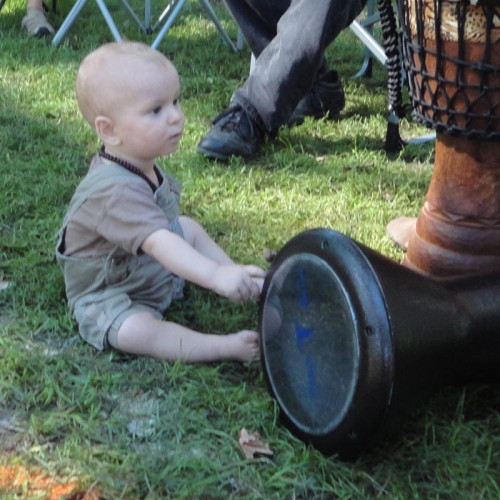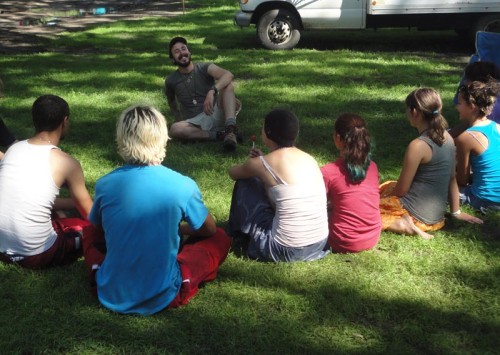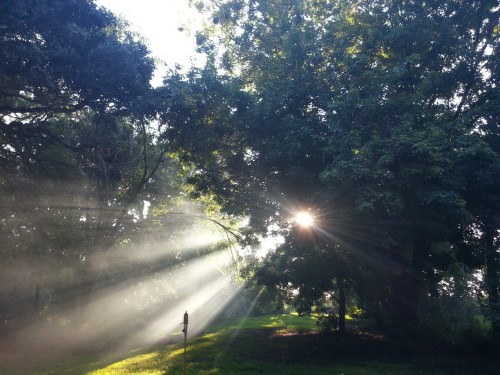When the Sacred Harvest Festival was finished, the first thing I noticed while wandering through the airport was how strange it was that nobody was in a sarong. Or naked. Or drumming. It was a shock to my system, all these pants and suits.

Even the babies drum at Sacred Harvest Festival. Photo by Nels Linde.
Pagan culture is sensory, and visceral, and delightfully messy. Meeting times are announced with music, worship is celebrated with movement, and the body is displayed as a sign of reverence, an act of liberation, and an expression of joy. Spend a week in the woods with a parley of Pagans and you start to believe that this is how the world actually is.
It was the ordinary aspects of the Sacred Harvest Festival that charmed me the most. The ever-present hospitality from the festival presenters made me feel at home from the moment I arrived, and I was never without a plate of food or a cup of some fine beverage in my hand. I was greeted with kindness, curiosity, and excitement, and I had the distinct feeling that I was welcome and wanted. There was a keen sense of fellowship at this gathering from all directions, and it wasn’t just “Minnesota nice” either. It felt completely genuine, and without pretense.
While ritual plays an important part in the festival, it was the post-ritual drumming and fire-dancing that seemed to attract a great deal of engagement from the festival attendees. In conversation with Kenny Klein, another of the featured national guests, I learned that this shift of emphasis away from ritual and more toward drumming and dancing is becoming more common at Pagan gatherings across the country, which leads me to wonder if the conversations about praxis v.s. belief that periodically dominate the Pagan blogosphere are actually representative of what is happening within the Pagan community.
To know the Pagan community primarily through the internet is to miss out on a great deal of nuance and subtlety. Our digital text lacks the contours of our faces, the undertones of fragrance and sound that are present when we gather in the flesh. Pagans make interesting noises. We say things that make your head cock a little to the side. We have a way of combining sacred symbolism with the sardonic that can infuriate the pious and delight the irreverent. We are a fascinating mixture of the holy and the profane, sometimes flipping either definition on its head. And I love that about us.
This all only became clear by being at a festival for a full seven days. Immersion is the best way to learn a new language, and immersive Paganism is no different. Share a meal with someone from a different tradition and you’ll come to know the myriad of ways that you mirror one another. Pass a horn in person to someone who, online, you regularly disagree with and you just might begin forging a real and meaningful friendship in spite of your differences. I didn’t realize this before, but most of my interactions with Pagans have been lacking the very embodiment that so many of our theologies hold dear.
Pagan festivals are staging grounds for transformation, should one wish to engage that deeply. When done well, they foster a safe space to learn, to practice, to rejoice, to inspect, and to play. Sacred Harvest Festival provided this to me, and to many of those who joined me in workshops or at rituals. During my unPaganism workshop we broke apart our assumptions about what it means to be a Pagan. We talked about our Euro-centric tendencies, our assumptions about ritual, and even began to examine our own susceptibility to the us/them dynamics that plague other religious communities. We did this with grace, with kindness, and with an inquiry that I found to be quite refreshing.

A youth workshop with Teo Bishop. Photo by Nels Linde.
There were others in attendance at the festival who had a challenging time feeling included by a community that feels so inclusive otherwise. The festival is in its 16th year, and there are many young people who have been coming to this gathering for their entire lives. I led a workshop for the youth, and found myself in conversation with them about their hopes for the festival and their desire for more youth-centered activities. They told me about a schism which took place in the community a few years back, and how before that time there was an entire portion of the festival grounds reserved exclusively for the youth. This “Youth Camp” provided kids the opportunity to camp away from their parents and to build a culture of their own. It was a cherished experience, and one that the Harmony Tribe youth miss very much.
In the grand scheme of things, our communities are young. Even those among us who reach back into the archives of history in search of an example are still a part of a relatively new community of religious practitioners. Our polytheist, or monist, or dualistic monotheist expressions are a mashup of the old and the new, and it is during events like Sacred Harvest Festival that we create the opportunities to re-examine our own definitions. We get a chance to look at what a Druid is, or a Witch, or a Hellenic, or a Hawaiian. Our skyclad dancing becomes a lovely metaphor: we show ourselves to one another; we allow ourselves to be seen, to be heard, to be known.
Festival culture is a petri dish, and the culture of a festival is enhanced and affected by each of the attendees. Sacred Harvest Festival feels very Wiccan-centric to a Druid who’s spent the past several years in community with reconstructionists, but this is not inherently a bad thing. My friend, Lamyka (Lahela MP Nihipali) reminded me during our unPaganism discussion that a core, central Pagan value — perhaps the most important one for us to remember — is pluralism. We need not forfeit our individual cultural traditions in order to take part in the greater Pagan community. We need not all become one thing in order to get along.
During this week in the woods I witnessed reconstructionists politely declining attendance at pan-Pagan rituals, siting religious reasons, and then I watched those same people engage in a different syncretic ritual because they found room within that particular ritual for their own cultural and religious interpretation. They found a way to both honor their own values and practices and observe a communal experience of celebration.
I find this flexibility to be a sign of great maturity, and an indication that the Pagan community has a bright future yet. If one among us can maintain her own sense of religious and cultural boundaries while still engaging in close, intimate contact with those of a very different perspective then there is evidence that we are not completely lost. We are not destitute, or fracturing beyond repair. We are not, as some blogging wars would have you believe, on the verge of meaninglessness.

Ritual Space at Sacred Harvest Festival. Photo by Mike Bardon.
We are young. We are learning. We are, should we wish to be, capable of great things. We offer generously of ourselves. We demonstrate hospitality in the most remarkable ways. We love and honor our Gods, and we do our best to love and honor each other.
This is what I witnessed at Sacred Harvest Festival. This is what gives me hope about moving forward as a contemplative Pagan, a bard, and a perpetual seeker.
The Wild Hunt is not responsible for links to external content.
To join a conversation on this post:
Visit our The Wild Hunt subreddit! Point your favorite browser to https://www.reddit.com/r/The_Wild_Hunt_News/, then click “JOIN”. Make sure to click the bell, too, to be notified of new articles posted to our subreddit.
“We need not forfeit our individual cultural traditions in order to take part in the greater Pagan community.” This is a wonderful explanation of pluralism and its benefits – thank you!
Thank you, John!
Beautifully-written description of what sounds like a beautiful festival. Thank you.
Thank you for your kind words.
Well written and very true! Thank you Teo, for allowing us to glean and absorb some of your wisdom and foresight. Thanks for coming and as a member of the Council, you are most welcome to return. It was a pleasure to see you and hear from you. Thank you also for your posting of this story of your experiences at Fest.
Thank you, LeeAnn. It was truly a pleasure to be there. I look forward to returning!
Certainly at some festivals people stay in their own camps and only come out at night for the music, drumming, fires, etc. What that means in the long term, I can’t say, although it is a chance from the chatauqua-style educational focus that many gatherings started with 30-40 years ago. Perhaps those needs are being met elsewhere, or some people do not feel that they need them at this time.
I love this idea of chatauqua-style educational focus in Pagan gatherings, Chas. I know from my experience at SHF that some of the most insightful, most meaningful conversations were taking place around our camp. It would be interesting to find ways to arrange or organize “salons” or “fireside chats” rather than traditional workshops. It may end up being more engaging for participants, and more pedagogically interactive.
I’ve only ever been to one festival-type thing (Witchfest, in Croydon, London) but I’d like to go to more.
The thing that puts me off is that all the festivals I’ve looked are, as said above, very much Wicca dominated.
Perhaps it is unavoidable, but the ‘Pagan scene’ that I can find is Wicca-normative, which just doesn’t appeal.
Thank you for your observations, Teo. You write, “We are, should we wish to be, capable of great things.”
I am delighted that you (among many others) are also noticing that Pagans still have a significant opportunity to choose greatness. I have noticed that this is true! I see, feel, smell, taste, and hear the emergence of that ‘greatness’ wherever I ever roam.
Keep up your good work, Teo.
May we all dare to dwell in beauty, balance and delight.
I’ve never been to a Pagan festival, or even talked in-person to another Pagan about our path, but this post has really urged me stronger than ever to seek out other Pagans in my area. As much as I enjoy the online Pagan community, I’m aware that interacting in person must be different, and I think it might be time for me to branch out! Even if the Pagans I meet have very different views and beliefs than me, there is always something to learn and something to gain. Thank you for this great post.
Thank you again for sharing your thoughts and experiences 🙂